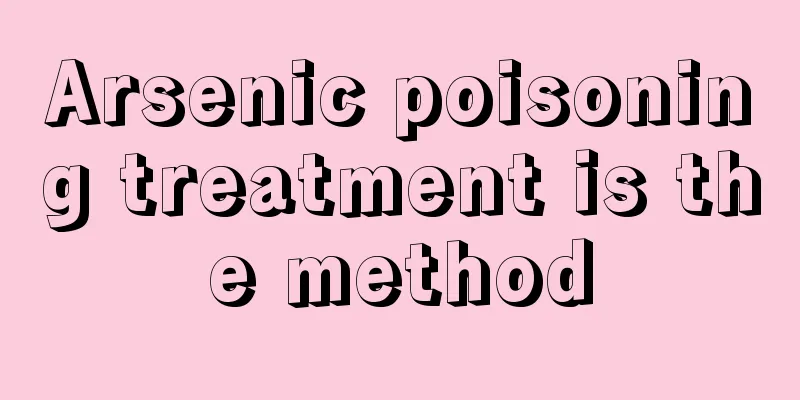Arsenic poisoning treatment is the method

|
In case of poisoning, you must pay attention to correct treatment and handling to avoid threatening your life. When treating, you must pay attention to scientific medication. For patients with severe abdominal pain, you can inject atropine or add pethidine. 1. Patients with acute oral poisoning should induce vomiting as soon as possible, or wash the stomach with warm water, saline or 1% sodium bicarbonate solution, and then immediately take freshly prepared ferric hydroxide (12% ferrous sulfate solution and 20% magnesium oxide suspension, mix equal amounts before use and shake well before use) to form insoluble ferric arsenate with arsenic, and then give sodium sulfate or magnesium sulfate as a catharsis. You can also inject 30g of activated carbon, 20-40g of magnesium oxide or egg white water (mix 4 egg whites with about 200ml of water) after gastric lavage. 2. There is an effective antidote for acute arsenic poisoning. Sodium dimercaptopropane sulfonate 5 mg/kg, intramuscularly or intravenously; the first dose of sodium dimercaptobutane 2g, dissolved in 10-20 ml of normal saline and injected intravenously, the course of treatment is 3-5 days. Penicillamine also has a certain effect in removing arsenic and should be used as early as possible (dosage, method, etc. follow the doctor's instructions). 3. Symptomatic and supportive treatment: For severe abdominal pain, intramuscular injection of atropine or pethidine can be used; for muscle spasm pain, calcium gluconate can be slowly injected intravenously. Supplement vitamin B, vitamin C, and vitamin K, and pay attention to preventing, treating and correcting dehydration, electrolyte imbalance and shock. Severely ill patients should undergo hemodialysis as soon as possible, which can effectively remove arsenic from the blood and prevent and treat acute renal failure. 4. Patients poisoned by hydrogen arsenide should receive oxygen inhalation and intravenous drip of 400-600 mg of hydrocortisone or 10-20 mg of methylprednisolone to inhibit hemolytic reaction. If hemoglobin drops to 5g, blood transfusion should be given. 5. Chronic arsenic poisoning can be treated with 10% sodium thiosulfate intravenous injection to assist renal excretion. Skin or mucous membrane lesions can be applied topically with 2.5% dimercaprol ointment or dexamethasone ointment. When multiple peripheral neuropathy occurs, symptomatic treatment is given. |
<<: How does Albizia Julibrissin treat insomnia? Is it effective?
>>: What are the treatments for lumbar bone hyperplasia
Recommend
What should I do if I have scarlet fever nephritis?
Infectious diseases can cause serious panic in li...
Why does my tongue feel numb? Causes of tongue numbness
Tongue numbness is more common among middle-aged ...
How to identify the authenticity of honey
We all know that there are many types of honey so...
What are the manifestations of viral infection in blood routine test?
It is very common to be infected by viruses in da...
What are the complications of hypertension? The seven most obvious symptoms
Surveys show that hypertension has become a commo...
The main causes of ovarian cancer
Among the many cancer diseases, the high incidenc...
Who is prone to pancreatic cancer
Pancreatic cancer is one of the common malignant ...
Cost of postoperative follow-up for endometrial cancer
Endometrial cancer is a group of epithelial malig...
Is chemotherapy useful for lung cancer metastasis? It has a certain effect
Chemotherapy is very effective for lung cancer me...
How to sterilize glass baby bottles
Milk bottles are mainly used to hold milk. As for...
To prevent colorectal cancer, you need to develop good dietary habits
Rectal cancer is one of the common malignant tumo...
Laser correction of myopia
Nowadays, more and more people are suffering from...
How many days after colon cancer surgery can I move around
The exact cause and mechanism of colon cancer, li...
What is the yellow thing in the shrimp head
Many people don’t know what the yellow stuff insi...
Gallbladder removal surgery process
Most of the dangerous surgeries nowadays are live...









